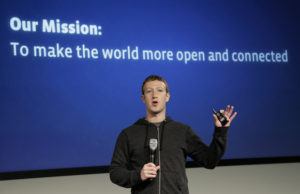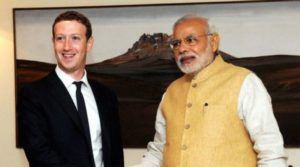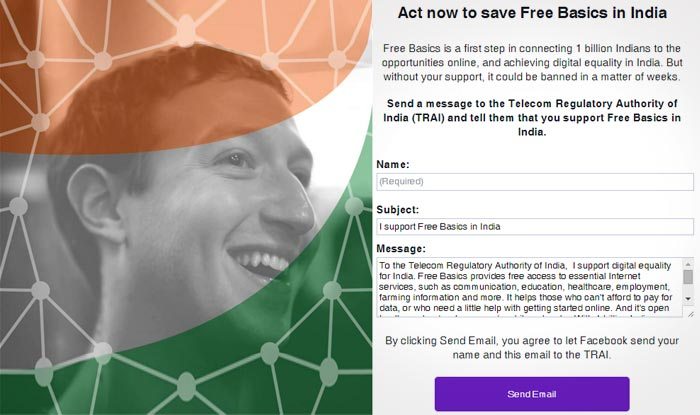There ain’t no such thing as free Internet

Why was Facebook’s attempt to provide free internet and transform its biggest potential market a failure?
Was it regressive to oppose this initiative? As Zuckerberg asked, “Who could possibly be against this?”
Or was there more than met the eye?
“The internet is one of the most powerful tools for economic and social progress. It gives people access to jobs, knowledge and opportunities. It gives voice to the voiceless in our society, and it connects people with vital resources for health and education.
I believe everyone in the world deserves access to these opportunities.”
– Mark Zuckerberg, CEO and Co-founder of Facebook[1]
Internet.org

In August, 2013, Facebook in partnership with Samsung, Ericsson, MediaTek, Nokia, Opera and Qualcomm, launched Internet.org[2], a project aimed at bringing affordable internet access to about five billion people world-over[3]. The project made waves throughout developing countries and Zuckerberg was lauded for his vision and philanthropy. Over the next few months, he spoke and wrote at various forums on the idea and importance of having free internet for all.
India was an important focus area for this initiative. In 2014, Zuckerberg visited India and met Prime Minister Modi and the IT Mi nister, assuring them to support their Digital India initiative[4].
nister, assuring them to support their Digital India initiative[4].
In 2015, Zuckerberg visited Indian villages, met locals, and pointed out how much free internet could benefit their lives.
No, thank you!
“Who could possibly be against this?” Zuckerberg asked in an article he wrote for an Indian newspaper.[5]
In April 2015, web-technology companies, mostly start-ups, started pulling out of this initiative and criticized it[6]. The problem had its roots in the principle of “zero rating”, which was fundamental to the “business model” of Internet.org. This meant that service providers would offer selective services and access to certain applications only. It went against the principle of ‘net neutrality’, which The Economist called “the idea that all data on the internet should be treated equitably, regardless of content or provenance.”[7] Common people were also worried that they might have to pay extra to access individual apps.
Not just philanthropy?
Facebook was blocked in China, making India, with its population of over 1.2 billion people, the biggest growth market for the social networking site[8]. It was alleged that Facebook wanted to dominate this massive market by monopolizing access of internet among those who could not afford it otherwise. Internet.org had partnered with local carrier Reliance Communications to offer “free internet services” in India. However, only 38 web sites or apps could be accessed without consuming or paying for internet[9]. Users would naturally be inclined to use these websites for free instead of paying for internet charges to use competing websites. In all fairness, none of the participating sites had paid or were paid to participate in Internet.org.
sites or apps could be accessed without consuming or paying for internet[9]. Users would naturally be inclined to use these websites for free instead of paying for internet charges to use competing websites. In all fairness, none of the participating sites had paid or were paid to participate in Internet.org.
But start-ups complained that they would never be on equal footing with these websites if the user is supposedly disincentivized to use new their products. As per their logic, Facebook, the phone carrier, and the limited number of sites could soon capture hundreds of millions of users in India, and by reducing their access to other sites, gradually build a monopoly over this massive customer base.
Save the Internet
Indian tech start-ups and internet activists launched the ‘Save the Internet’ campaign[10] to promote net neutrality and save the fundamental architecture of internet, as Internet.org was “threatening freedom of expression, equality of opportunity, security, privacy and innovation.”[11] Countries such as USA, Netherlands, Chile, Brazil, etc. already had regulations or laws favoring net neutrality.
Popular comedy group All India Bakchod simplified the message to explain it to the common man – [12]
Save the Internet appealed to the common masses to voice their discontent to the concerned regulator, Telecom Regulatory Authority of India (TRAI). It was estimated that over a million emails were sent to TRAI, which had asked for comments on a consultation paper.[13]
The “Business” Model
The author believes that it started becoming evident that Facebook and service providers had business interests in mind while offering free internet. They could capture and own a big share of internet users and eventually be paid by some websites to keep off their competition. While Facebook tried to make certain changes in their model because of the protests, they did not agree to let all websites be used without data charges.
Instead, the initiative was rebranded and given a new name – ‘Free Basics’. The fresh branding with a powerful connotation again received a major lobbying push by its proponents, but it was soon realized as a case of astroturfing and repackaging, and was rebuked by TRAI.[14]
Sad ending
On February 8, 2016, TRAI banned the Free Basics service. Within three days, Facebook withdrew the platform from India.
The author believes that Facebook tried to pursue a business interest in the name of philanthropy. If this was not their intention, they should have not discriminated among websites and offered genuinely free internet, which would have been transformative for developing countries, and have truly led into a digital transformation.
790 words
[1] https://www.facebook.com/zuck/posts/10102033678947881
[2] https://info.internet.org/en/
[3] https://techcrunch.com/2013/08/20/facebook-internet-org/
[4] http://indianexpress.com/article/india/india-others/facebook-ceo-mark-zuckerberg-meets-prime-minister-narendra-modi/
[5] http://blogs.timesofindia.indiatimes.com/toi-edit-page/free-basics-protects-net-neutrality/
[6] http://www.businessinsider.com/indian-tech-companies-are-pulling-out-of-facebooks-internetorg-campaign-over-net-neutrality-violations-2015-4
[7] http://www.economist.com/blogs/babbage/2014/09/net-neutrality
[8] https://www.statista.com/statistics/268136/top-15-countries-based-on-number-of-facebook-users/
[9] http://www.huffingtonpost.in/2015/04/15/internetorg-withdrawal_n_7071532.html
[10] http://www.savetheinternet.in/
[11] https://www.facebook.com/notes/access-now/open-letter-to-mark-zuckerberg-regarding-internetorg-net-neutrality-privacy-and-/935857379791271/
[12] https://www.youtube.com/watch?v=mfY1NKrzqi0
[13] http://indianexpress.com/article/india/india-others/net-neutrality-debate-in-regulator-inbox-a-million-messages-for-net-neutrality/
[14] http://indianexpress.com/article/technology/social/trai-slams-facebook-letter-on-free-basics-campaign-wholly-misplaced/






Thanks for the provocative post! I completely understand the more cynical side of thinking Facebook limited the number of websites/apps that could be accessed to gain market share. I wonder if any of this is related to costing as well. Would the free internet be more costly if all the internet was available, just due to the broadband needed and how often it would be accessed? I can imagine with limited apps the use would be less because there is not as much need to be constantly online. Just a thought on if the economics of the limited internet might have prompted them to initially restrict the free usage. Would it have been better to restrict to a certain amount of time or bandwidth?
Very good point. If cost was indeed a concern, as you rightly pointed out, there could have been a restriction on the time or bandwidth. That is very similar to mobile phone companies giving data packs with limits. The fairness issue crops up when the restriction is based on specific websites.
Great post Sid! I don’t think “zero rating” should fall under the rules of net neutrality in general. Regardless of Facebook’s intent, the company was willing to provide free internet access to poor Indians so they could join the platform. The company is not discriminating against other web traffic, it’s simply providing its own services for free. The same can be said for what AT&T is doing by allowing its DirectTV subscribers to stream that service for free. Yes… this practice does put startups at a disadvantage and further strengthens the incumbent’s brand, but at the end of the day the customer benefits. If I were an Indian consumer, I’d rather get just Facebook for free than have no internet at all.
AJ, by favoring certain websites and thereby disadvantaging others, this initiative would move us in a direction in which there will be limited product innovation, less incentive to drive prices lower, and possibly price gouging by the favored websites. This would be detrimental to the consumer.
Thanks for sharing your perspective on this interesting issue. I share Kelly’s question about why they ended up limiting the service to only a very small number of sites given that none of those sites paid or were paid by Internet.org. It’s understandable that Internet.org wanted to restrict how much data they would have to carry, but I’d have a thought they would perhaps impose uniform, low limits on what individual users could access but still allow them access to the entire internet. Their reluctance to do so certainly raised for me the alarm bells you mention in your post that Facebook’s intention here was to create a huge captive user base.
AJ, I think you bring up a good point that perhaps zero rating shouldn’t fall under the principle of net neutrality and that Facebook is providing a service for free and that the Indian consumer might want this option. While I’m generally in agreement, I think I have two concerns here that make me agree with how TRAI came out. First, Internet.org is not providing just any type of free service but something more akin to the access provided by a utility (to electricity, the telephone, or the internet). I think those industries should be regulated more heavily because they naturally tend towards monopolies who can take great advantage of consumers. Second, even if short term some Internet access is better than none, allowing limited Internet access that doesn’t respect net neutrality will in the long-run result in companies (especially ones like Facebook that rely on network effects) with greater monopoly power over consumers, hindering innovation and extracting rents from consumers.
Both very good points, RG! I just want to highlight how important openness, transparency and innovation have been to the internet as we know it today.
(Who are you btw? :P)
I completely agree with AJ; while I don’t disagree that this was an approach that looked to benefit Facebook, I believe that some limited internet is better than none. You could easily say that governments restricting access to internet or specific sites is similar. Or indeed that Google taking money from companies to prioritize certain search results skews a customer’s experience of what’s online just as much. I am not saying this is philosophically ‘right’ – I agree that equality of information is the ideal – but given that it happens, and happens legally, I don’t necessarily think this shouldn’t have been allowed.
I also think that Facebook were one of only a handful of companies that had the resources and technology to provide such a service; with the exception of Google and perhaps one or two others, it’s hard to think of a non-governmental power that could have rolled out internet so quickly to low-income users in India. Is there an argument to be made that they were taking some sort of responsibility here?
LG, what are your thoughts on Facebook masquerading this as a philanthropic and visionary initiative? If it were indeed a business interest, it should not have been repackaged into something “noble”.
Great article, Sid. I wrote about the same topic and I believe we generally have the same opinion of Internet.org and Free Basics. However, having worked at Facebook and knowing many people that work at Facebook, part of me believes that Facebook initially had good intentions when launching Internet.org. I actually believe that Zuckerberg’s initial goal may have been altruistic. However, in order for other companies to get involved, they needed to see a good business reason to do so. Additionally, Zuckerberg and Facebook probably didn’t realize the scale and scope of money and resources required to complete their mission.
I guess my question to you is this: Do you think Internet.org was always a money-making, user acquisition scheme? Or do you think it may have originally had altruistic intentions, but the reality of business forced Zuckerberg and Facebook to turn it into a money-making scheme for itself and its partners? I am still unsure how I feel about this myself.
Sidney!!!!! Great post. I think Mr. Zuck has a strong PR team. As much as I believe him to be the “nice” guy he is so often portrayed in the press, I do think that his “free internal to all” campaign has some business ties for Facebook. Whoever manages to be in control of the provision of internet for any country has the ability to control a nation. Perhaps India was correct is suggesting that they would rather provide the service themselves than let Mr. Zuckerberg dominate what it’s citizens were seeing.